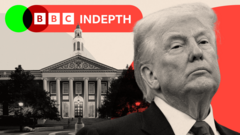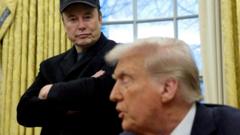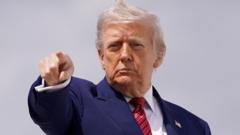The decision to increase tariffs from 25% to 50% has prompted the EU to warn of potential countermeasures, putting bilateral trade discussions at risk and complicating the UK’s separate trade talks with the US.
EU Decries US Tariff Hike as Trade Tensions Escalate

EU Decries US Tariff Hike as Trade Tensions Escalate
The European Union has expressed strong regret over President Trump's announcement to double tariffs on steel and aluminium, raising fears of a breakdown in trade negotiations.
The European Union has conveyed substantial disappointment regarding President Donald Trump's unexpected plan to double tariffs on steel and aluminium, a move that could jeopardize ongoing trade negotiations. At a rally held in Pittsburgh, Trump declared that tariffs would increase from 25% to 50%, asserting that this would bolster local manufacturing and ensure national supply security.
In a statement issued to the BBC, the European Commission articulated its concerns, indicating that such a tariff hike "undermines ongoing efforts" to find a negotiated solution. The EU warned of potential "countermeasures" in response, raising uncertainty about the effects on the global economy and potential cost increases for both consumers and businesses in the EU and the US.
Moreover, this tariff adjustment casts doubts on the UK's separate trade agreement with the US, which, though negotiated, remains unsigned. Officials from the UK government confirmed they are in discussions with the US regarding the implications of the tariff increase on their intended trade relationships.
Amid a backdrop of declining US steel production, the increase in tariffs aims to reduce imports and relies heavily on the commitment that no job losses will occur, as emphasized by Trump during the announcement. He also mentioned a prospective investment of $14 billion in steel production through a partnership with Japan's Nippon Steel.
The announcement forms part of Trump's broader and contentious strategy regarding tariffs since he resumed office earlier this year, amidst a series of legal challenges over his global tariff impositions. With previous deadlines for tariff negotiations being pushed back, tensions are high, and the prospect of actively contested trade relations looms large unless an amicable agreement is reached soon.




















